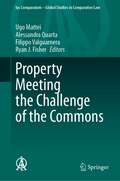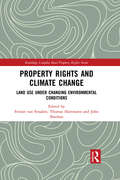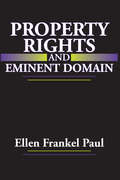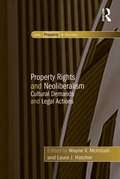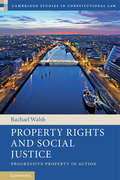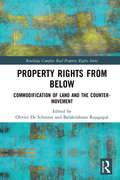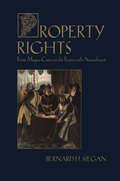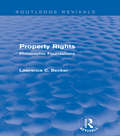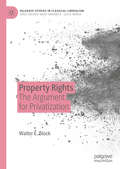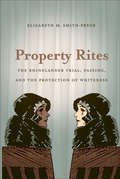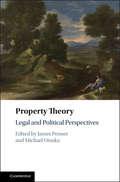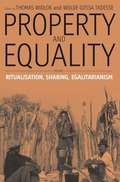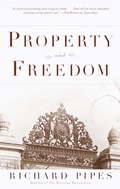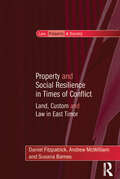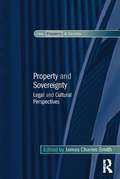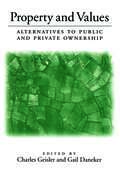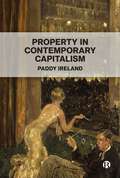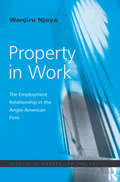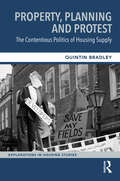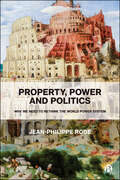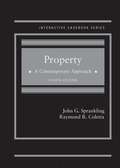- Table View
- List View
Property Meeting the Challenge of the Commons (Ius Comparatum - Global Studies in Comparative Law #59)
by Ugo Mattei Alessandra Quarta Filippo Valguarnera Ryan J. FisherThis book explores the challenge that the commons present to the private-public dichotomy in a wide variety of national legal systems representing the West European legal tradition as well as post-socialist and post-colonial experiences. It presents national reports from 13 jurisdictions, ranging from Belgium and the South Africa to the US. Constituting the outcome of the 20th General Congress of the International Academy of Comparative Law, held in Fukuoka, Japan in July 2018, it offers a valuable and unique resource for the study of comparative law.
Property Outlaws: How Squatters, Pirates, and Protesters Improve the Law of Ownership
by Eduardo M. Penalver Sonia K. KatyalProperty Outlaws puts forth the intriguingly counterintuitive proposition that, in the case of both tangible and intellectual property law, disobedience can often lead to an improvement in legal regulation. The authors argue that in property law there is a tension between the competing demands of stability and dynamism, but its tendency is to become static and fall out of step with the needs of society. The authors employ wide-ranging examples of the behaviors of "property outlaws"--the trespasser, squatter, pirate, or file-sharer--to show how specific behaviors have induced legal innovation. They also delineate the similarities between the actions of property outlaws in the spheres of tangible and intellectual property. An important conclusion of the book is that a dynamic between the activities of "property outlaws" and legal innovation should be cultivated in order to maintain this avenue of legal reform.
Property Rights In Post-soviet Russia: Violence, Corruption, and the Demand for Law
by Jordan Gans-MorseThe effectiveness of property rights - and the rule of law more broadly - is often depicted as depending primarily on rulers' 'supply' of legal institutions. Yet the crucial importance of private sector “demand” for law is frequently overlooked. This book develops a novel framework that unpacks the demand for law in Russia, building on an original enterprise survey as well as extensive interviews with lawyers, firms, and private security agencies. By tracing the evolution of firms' reliance on violence, corruption, and law over the two decades following the Soviet Union's collapse, the book clarifies why firms in various contexts may turn to law for property rights protection, even if legal institutions remain ineffective or corrupt. The author's detailed demand-side analysis of property rights draws attention to the extensive role that law plays in the Russian business world, contrary to frequent depictions of Russia as lawless.
Property Rights and Climate Change: Land use under changing environmental conditions (Routledge Complex Real Property Rights Series)
by Thomas Hartmann Fennie Van Straalen John SheehanProperty Rights and Climate Change explores the multifarious relationships between different types of climate-driven environmental changes and property rights. This original contribution to the literature examines such climate changes through the lens of property rights, rather than through the lens of land use planning. The inherent assumption pursued is that the different types of environmental changes, with their particular effects and impact on land use, share common issues regarding the relation between the social construction of land via property rights and the dynamics of a changing environment. Making these common issues explicit and discussing the different approaches to them is the central objective of this book. Through examining a variety of cases from the Arctic to the Australian coast, the contributors take a transdisciplinary look at the winners and losers of climate change, discuss approaches to dealing with changing environmental conditions, and stimulate pathways for further research. This book is essential reading for lawyers, planners, property rights experts and environmentalists.
Property Rights and Eminent Domain
by Ellen Frankel PaulIn a country built on the institution of private property, property-owner rights have been under attack. By arguing that private property is a fundamental liberty whose protection deserves the highest priority, Ellen Frankel Paul challenges one of the dominant trends of the past half century: the erosion of property rights via zoning and land use restrictions, carried on by government exercising its "police power" or promoting "the public interest." Paul begins by examining the arguments of environmentalists in support of land-use legislation, and explores a few particularly troubling examples of the exercise of eminent domain and police powers. She traces the philosophical arguments for the two powers as well as their tortuous judicial history, the meaning of property rights and investigates how previous thinkers have defended these rights is detailed, and Paul suggests a more adequate defense for them. In the concluding portion of the book, the very legitimacy of eminent domain is questioned and the author offers recommendations for its reform. This analysis is wide in scope and makes creative use of historical, legal, economic, and philosophic methodologies. It not only gives an account of the present power regulations on land, but also provides an exhaustive history of the development of the law in these two areas and of the philosophical ideas of the thinkers who helped shape this process. This book is distinctive because it places a theory of the just acquisition of property at the heart of the answer to the question of the extent to which governments can rightfully exercise the powers of eminent domain and police. "Amazingly, in a country built on the institution of private property, the right to property in land has been under increasing assault, and has seldom been defended. Paul's book--by arguing that private property is a fundamental liberty whose protection deserves the highest priority--is a major step toward filling the void."--Robert Hessen, Stanford University
Property Rights and Neoliberalism: Cultural Demands and Legal Actions (Law, Property and Society)
by Laura J. HatcherProperty rights and efforts to curb state appropriation of private properties for public purposes have always held high status on the political agenda of the US and many other nations that feature a corporate capitalist economic system. In addition to this, over the last several decades conservative libertarian and neo-liberal groups have put constitutional demands for greater property protection on the agendas of courts in several countries. Studying property rights mobilization in both domestic and comparative contexts, the contributors to this volume bring a range of social science perspectives to address three primary issues: the contours and characteristics of property rights mobilizations; the degree to which property rights movements have influenced development of law in demonstrable ways; and the broader cultural, social and economic implications of modern-era property rights litigation and legal mobilizations. This will be a key text for anyone working within or interested in property rights.
Property Rights and Social Justice: Progressive Property in Action (Cambridge Studies in Constitutional Law)
by Rachael WalshProperty Rights and Social Justice analyses 'progressive property' in action by examining the role of constitutional property rights guarantees in mediating private ownership and social justice. It combines insights from property theory with enlightening doctrinal analysis of the interaction between property rights and social justice in the constitutional and broader legal context. It does so through the prism of the Irish Constitution's property guarantees, which uniquely in the English-speaking, common law world both protect property rights and requires their regulation by the State to secure social justice. Through this analysis, the book grounds key debates in contemporary property theory in fresh, illuminating doctrinal examples, and enhances global debates about the constitutional protection of property rights. It argues that primacy is perhaps inevitably afforded to political determinations about the appropriate mediation of property rights and social justice, meaning that the political impact of constitutionalisation needs to be disentangled from its strict legal effects.
Property Rights from Below: Commodification of Land and the Counter-Movement (Routledge Complex Real Property Rights Series)
by Olivier De Schutter Balakrishnan RajagopalRecent years have seen a globalization of property rights as the Western conception of property over land has extended across the world. As formerly community-owned land and natural resources are privatized and titling schemes proliferate, Property Rights from Below questions the trend toward treating land as a commodity and explores alternatives to the Western model. As we enter an era of resource scarcity and as competition for land and associated natural resources increases, purchasing power cannot become the sole criterion for land allocation; and the law of supply and demand in increasingly financialized markets cannot become the sole metric through which the value of land is determined. Using a range of examples from around the world, Property Rights from Below demonstrates that alternatives to this model often emerge from social innovations supported by local communities and that there is an urgent need for a broader political imagination when it comes to land governance. This innovative cross-disciplinary perspective on the pressing problems surrounding global property rights will be of interest to academics, students and professionals with an interest in property law, development economics and land governance.
Property Rights: From Magna Carta to the Fourteenth Amendment
by Bernard SieganProperty Rights: From Magna Carta to the Fourteenth Amendment breaks new ground in our understanding of the genesis of property rights in the United States. According to the standard interpretation, echoed by as lofty an authority as Supreme Court Justice Harry Blackmun, the courts did little in the way of protecting property rights in the early years of our nation. Not only does Siegan find this accepted teaching erroneous, but he finds post-Colonial jurisprudence to be firmly rooted in English common law and the writings of its most revered interpreters. Siegan conducts an exhaustive examination of property rights cases decided by state courts between the time of the ratification of the U.S. Constitution in 1788 and the adoption of the Fourteenth Amendment in 1868. This inventory, which in its sweep captures scores of cases overlooked by previous commentators on the history of property rights, reveals that the protection of these rights is neither a relatively new phenomenon nor a heritage with precarious pedigree. These court cases, as well as early state constitutions, consistently and repeatedly embraced key elements of a property rights jurisprudence, such as protection of the privileges and immunities of citizens, due process of law, equal protection under the law, and prohibitions on the taking of property without just compensation. Case law provides overwhelming evidence that the American legal system, from its inception, has held property rights and their protection in the highest regard.The American Revolution, Siegan reminds us, was fought largely to affirm and protect private property rights-that is, to uphold the "rights of Englishmen"-even if it meant that the colonists would cease being Englishmen. John Locke and other great theoreticians of property rights understood their importance, not only to individuals who happened to possess property, but to the preservation of a free society and to the prosperity of its inhabitants. Siegan's contribution to this venerable tradition lies in his faithful reconstruction of our legal history, which allows us to see just how central property rights have been to the American experiment in liberty-from the very beginning.
Property Rights: Philosophic Foundations (Routledge Revivals)
by Lawrence C. BeckerProperty Rights: Philosophic Foundations, first published in 1977, comprehensively examines the general justifications for systems of private property rights, and discusses with great clarity the major arguments as to the rights and responsibilities of property ownership. In particular, the arguments that hold that there are natural rights derived from first occupancy, labour, utility, liberty and virtue are considered, as are the standard anti-property arguments based on disutility, virtue and inequality, and the belief that justice in distribution must take precedence over private ownership. Lawrence Becker goes on to contend that there are four sound lines of argument for private property that, together with what is sound in the anti-property arguments, must be co-ordinated to form the foundations of a new theory. He therefore expounds a concise but sophisticated theory of property that is relevant to the modern world, and concludes by indicating some of the implications of his theory.
Property Rights: The Argument for Privatization (Palgrave Studies in Classical Liberalism)
by Walter E. BlockIn this timely book, Walter E. Block uses classical liberal theory to defend private property rights. Looking at how free enterprise, capitalism and libertarianism are cornerstones of economically prosperous civilizations, Block highlights why private property rights are crucial. Discussing philosophy, libertarian property rights theory, reparations and other property rights issues, this volume is of interest to academics, students, journalists and all those interested in this integral aspect of political economic philosophy.
Property Rites: The Rhinelander Trial, Passing, and the Protection of Whiteness
by Elizabeth M. Smith-PryorIn 1925 Leonard Rhinelander, the youngest son of a wealthy New York society family, sued to end his marriage to Alice Jones, a former domestic servant and the daughter of a "colored" cabman. After being married only one month, Rhinelander pressed for the dissolution of his marriage on the grounds that his wife had lied to him about her racial background. The subsequent marital annulment trial became a massive public spectacle, not only in New York but across the nation--despite the fact that the state had never outlawed interracial marriage. Elizabeth Smith-Pryor makes extensive use of trial transcripts, in addition to contemporary newspaper coverage and archival sources, to explore why Leonard Rhinelander was allowed his day in court. She moves fluidly between legal history, a day-by-day narrative of the trial itself, and analyses of the trial's place in the culture of the 1920s North to show how notions of race, property, and the law were--and are--inextricably intertwined.
Property Theory: Legal and Political Perspectives
by James Penner Michael OtsukaProperty, or property rights, remains one of the most central elements in moral, legal, and political thought. It figures centrally in the work of figures as various as Grotius, Locke, Hume, Smith, Hegel and Kant. This collection of essays brings fresh perspective on property theory, from both legal and political theoretical perspectives, and is essential reading for anyone interested in the nature of property. Edited by two of the world's leading theorists of property, James Penner and Michael Otsuka, this volume brings together essays which consider, amongst other topics, property and public law, the importance of legal forms in property theory, whether use or exclusion are most essential to our understanding of property, distributive justice, Lockean and Grotian theories, the common ownership of the Earth, and Confucian ideas of property.
Property and Equality, Volume 1: Ritualisation, Sharing, Egalitarianism
by Thomas Widlok Wolde Gossa TadesseThe ethnography of egalitarian social systems was first met with sheer disbelief. Today it is still hotly debated in a number of fields and has gained sophistication as well as momentum. This collection of essays on "property and equality" acknowledges this diversification by presenting research results in two complementary volumes. They bring together a wide range of authoritative researchers most of whom have worked with hunter-gatherer groups. These two volumes cover existing ethnographic and theoretical ground while maintaining a clear focus on the relation between property and equality. The book consists of the most recent work of prominent members of the original group of researchers in hunter-gatherer studies among them James Woodburn and Richard Lee, and very recent ethnography on hunter-gatherers and other egalitarian systems.
Property and Freedom
by Richard PipesProperty, asserts Richard Pipes, is an indispensable ingredient not only of economic progress but also of liberty and the rule of law. In his new book, the Harvard scholar demonstrates how, throughout history, private ownership has served as a barrier to the power of the state, enabling the Western world to evolve enduring democratic institutions. He traces the development of private property, beginning with ancient Greece and Rome, where property rights in the modern sense first made their appearance. He explains how notions of ownership matured in late medieval times with the great expansion of commerce and the growth of cities. He shows how England, as the first country to treat land as a commodity and to develop a robust defense of property rights, also became the first to institute a parliamentary government capable of restraining the powers of royalty. In pre-nineteenth-century Russia, on the other hand, the absence of private land ownership deprived its citizens of the leverage to limit the authority of their tsars. Pipes describes the attitudes toward property of twentieth-century totalitarian states and points out that in the United States the protection of private property, rooted in the principles of the Founding Fathers, has been a major contributor to the commonweal. However, he warns that contemporary trends in the treatment of property--in a century that, he suggests, has been unfavorable to the institution--threaten to undermine the rights of citizens. And he makes clear why he believes that excessive interference by government, even when intended to promote the "common good," could lead to a diminution of freedom.
Property and Practical Reason
by Adam J. MacleodProperty and Practical Reason makes a moral argument for common law property institutions and norms, and challenges the prevailing dichotomy between individual rights and state interests and its assumption that individual preferences and the good of communities must be in conflict. One can understand competing intuitions about private property rights by considering how private property enables owners and their collaborators to exercise practical reason consistent with the requirements of reason, and thereby to become practically reasonable agents of deliberation and choice who promote various aspects of the common good. The plural and mediated domains of property ownership, though imperfect, have moral benefits for all members of the community. They enable communities and institutions of private ordering to pursue plural and incommensurable good ends while specifying the boundaries of property rights consistent with basic moral requirements.
Property and Social Resilience in Times of Conflict: Land, Custom and Law in East Timor (Law, Property and Society)
by Daniel Fitzpatrick Andrew McWilliamPeace-building in a number of contemporary contexts involves fragile states, influential customary systems and histories of land conflict arising from mass population displacement. This book is a timely response to the increased international focus on peace-building problems arising from population displacement and post-conflict state fragility. It considers the relationship between property and resilient customary systems in conflict-affected East Timor. The chapters include micro-studies of customary land and population displacement during the periods of Portuguese colonization and Indonesian military occupation. There is also analysis of the development of laws relating to customary land in independent East Timor (Timor Leste). The book fills a gap in socio-legal literature on property, custom and peace-building and is of interest to property scholars, anthropologists, and academics and practitioners in the emerging field of peace and conflict studies.
Property and Sovereignty: Legal and Cultural Perspectives (Law, Property and Society)
by James Charles SmithThis book explores the relationships between property and the concept of sovereignty from a number of different perspectives. It distinguishes between the dual meaning of 'sovereignty' in property discourse - political sovereignty and owner sovereignty. The contributors discuss the nature of sovereignty in both senses, applying it to a wide range of topics such as the evolution of property rights in fragile and conflict-affected nation states, and notions of sovereign property in new worlds. A section on the Arts illuminates the relationships between property, sovereignty, and culture, and a further section investigates regulatory property and governmental control over resources. The book concludes with an exploration of sovereign shaping of private property entitlements to achieve instrumental ends. This interesting collection will be valuable to those in the fields of legal philosophy, property theory, international and comparative law, and political sociology. This book explores the relationships between property and the concept of sovereignty from a number of different perspectives. It distinguishes between the dual meaning of ’sovereignty’ in property discourse - political sovereignty and owner sovereignty. The contributors discuss the nature of sovereignty in both senses, applying it to a wide range of topics such as the evolution of property rights in fragile and conflict-affected nation states and notions of sovereign property in new worlds. A section on The Arts illuminates the relationships between property, sovereignty and culture and a further section investigates regulatory property and governmental control over resources. The book concludes with an exploration of sovereign shaping of private property entitlements to achieve instrumental ends. This interesting collection will be valuable to those in the fields of legal philosophy, property theory, international and comparative law, and political sociology.
Property and Values: Alternatives To Public And Private Ownership
by Charles Geisler Gail DanekerProperty and Values offers a fresh look at property rights issues, bringing together scholars, attorneys, government officials, community development practitioners, and environmental advocates to consider new and more socially equitable forms of ownership. Based on a Harvard Law School conference organized by the Equity Trust, Inc., in cooperation with the American Bar Association's Commission on Homelessness and Poverty, the book: explains ownership as an evolving concept, determined by social processes and changing social relations challenges conventional public-private ownership categories surveys recent studies on the implications of public policy on property values offers examples from other cultures of ownership realities unfamiliar or forgotten in the United States compares experiments in ownership/equity allocation affecting social welfare and environmental conservation The book synthesizes much innovative thinking on ownership in land and housing, and signals how that thinking might be used across America. Contributors - including David Abromowitz, Darby Bradley, Teresa Duclos, Sally Fairfax, Margaret Grossman, C. Ford Runge, William Singer and others - call for balance between property rights and responsibilities, between private and public rights in property, and between individual and societal interests in land.Property and Values is a thought-provoking contribution to the literature on property for planners, lawyers, government officials, resource economists, environmental managers, and social scientists as well as for students of planning, environmental law, geography, or public policy.
Property in Contemporary Capitalism
by Paddy IrelandAmid the shift towards neoliberalism and the privatization of resources, this book provides a radical new lens to view property and property theory. Boldly challenging the conventional theories of property law that have shaped our understanding for centuries, leading expert Paddy Ireland explores the rise and growth of new intangible property forms; the nature of ‘investment’ and of property-as-capital; and the empirical realities of modern property. Raising broader questions about ownership in society, the author ignites a powerful conversation about the increasingly unequal distribution of wealth, forcing us to confront that our current property system bears considerable responsibility for the current ‘polycrisis. This groundbreaking work will set the agenda for a new era in property theory.
Property in Work: The Employment Relationship in the Anglo-American Firm (Studies In Modern Law And Policy Ser.)
by Wanjiru NjoyaThe notion of property in work has deep historical roots in the common law tradition, but is yet to receive the attention it deserves. In this timely and thought-provoking book, Wanjiru Njoya contrasts ideas of ownership and property rights in English, American and European labour law, and considers their practical implications. The author's contention that shared ownership within a stakeholder theory of the firm allows better protection of both shareholders' and employees' interests in the large public corporation, puts employee-participation firmly back on the corporate governance agenda. The book offers a refreshing new perspective on how a more socially desirable balance between economic flexibility and job security may be achieved.
Property, Planning and Protest: The Contentious Politics of Housing Supply (Explorations in Housing Studies)
by Quintin BradleyThe struggle for the right to housing is a battle over property rights and land use. For housing to be provided as a human need, land must be recognised as a common right. Property, Planning and Protest is a compelling new investigation into public opposition to housing and real estate development. Its innovative materialist approach is grounded in the political economy of land value, and it recognises the conflict between communities and real estate capital as a struggle over land and property rights. Property, Planning and Protest is about a social movement struggling for democratic representation in land-use decisions. The amenity groups it describes champion a democratic plan-led system that allocates land for social and environmental goals. Situating this movement in a history of land reform and common rights, this book sets out a persuasive new vision of democratic planning and affordable housing for all.
Property, Power and Politics: Why We Need to Rethink the World Power System
by Jean-Philippe RobéGlobalization is an extraordinary phenomenon affecting virtually everything in our lives. And it is imperative that we understand the operation of economic power in a globalized world if we are to address the most challenging issues our world is facing today, from climate change to world hunger and poverty. This revolutionary work rethinks globalization as a power system feeding from, and in competition with, the state system. Cutting across disciplines of law, politics and economics, it explores how multinational enterprises morphed into world political organisations with global reach and power, but without the corresponding responsibilities. In illuminating how the concentration of property rights within corporations has led to the rejection of democracy as an ineffective system of government and to the rise in inequality, Robé offers a clear pathway to a fairer and more sustainable power system.
Property, Predation, and Protection
by Stanislav MarkusWhat threatens the property rights of business owners - and what makes these rights secure? This book transcends the conventional diagnosis of the issue in modern developing countries by moving beyond expropriation by the state ruler or by petty bureaucratic corruption. It identifies "agent predation" as a novel threat type, showing it to be particularly widespread and detrimental. The book also questions the orthodox prescription: institutionalized state commitment cannot secure property rights against agent predation. Instead, this volume argues that business actors can hold the predatory state agents accountable through firm-level alliances with foreign actors, labor, and local communities. Beyond securing ownership, such alliances promote rule of law in a rent-seeking society. Taking Russia and Ukraine between 2000 and 2012 as its empirical focus, the book advances these arguments by drawing on more than 150 qualitative interviews with business owners, policy makers, and bureaucrats, as well as an original large-N survey of firms.
Property: A Contemporary Approach (Interactive Casebook)
by John Sprankling Raymond ColettaThis casebook is designed to introduce property law to 21st-century law students. It presents the core concepts of property law in a streamlined format that is clear and easy to understand, while maintaining the intellectual challenge of the subject. The book covers the standard property topics with a blend of familiar and modern cases selected to appeal to today's students. It also includes sections on intellectual property and environmental law. As with other books in the Interactive Casebook Series, the accompanying electronic version allows students immediate access to the full text of cited cases, statutes, articles, and other materials in the Westlaw database. In addition, the electronic version includes over 200 photographs, maps, diagrams, original documents, and audio clips that help students understand the case materials, together with more than 300 multiple choice questions and answers so that students can assess their progress.
